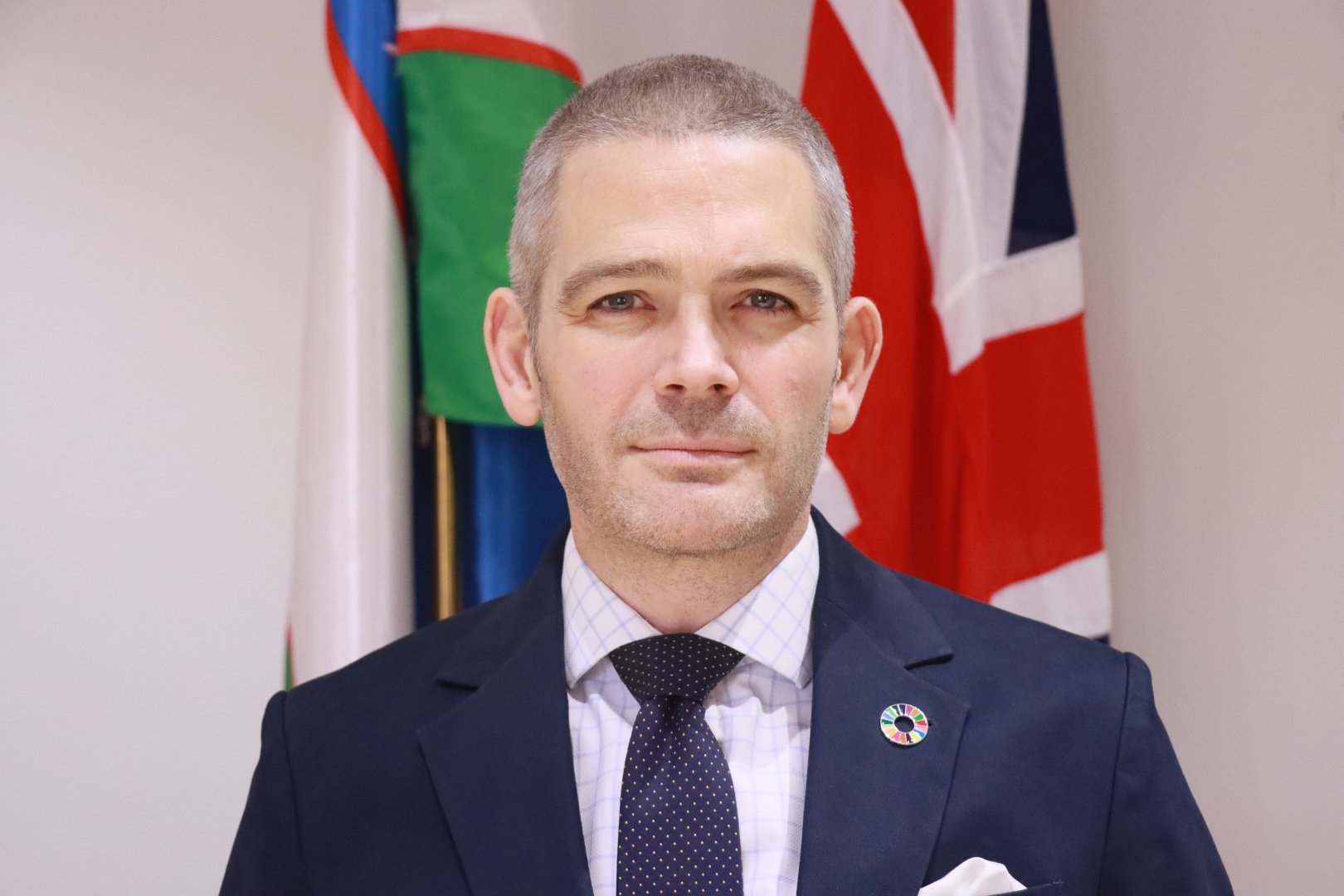BAKU, Azerbaijan, December 19. The UK is fully supportive of Uzbekistan’s aim to join the World Trade Organization (WTO) and to further increase links to international trade, the UK Ambassador to Uzbekistan Timothy Smart told Trend in an exclusive interview.
“We are already a firm partner and friend to Uzbekistan, but there is great potential to do more together, including through the Tashkent to Samarkand high-speed rail project, green energy, or educational links. The latter is ever more important owing to the growing popularity of the English language amongst the younger Uzbeks,” he said.
The ambassador noted that the annual trading relationship between the UK and Uzbekistan is worth close to $500 million and underscored the opportunity for significant expansion.
“We are working closely with UK businesses that are interested in Uzbekistan across numerous sectors, including education, infrastructure, clean mining, and financial and professional services. At the governmental level, we are working on agreements to boost trade and economic cooperation, such as the Memorandum of Understanding on Connectivity, which was signed by the former Foreign Secretary, Lord Cameron, and the Foreign Minister of Uzbekistan, Bakhtiyor Saidov, in April 2024. This will encourage UK and Uzbek businesses to work together on Uzbekistan's major infrastructure projects. We also offer competitive financing support through UK Export Finance and Enhanced Preferences to Uzbek businesses that export to the UK through our Developing Countries Trading Scheme,” he elaborated.
Discussing environmental challenges, Ambassador Smart stressed the importance of transitioning to clean energy and improving energy efficiency in Uzbekistan.
“Clean energy transition and energy efficiency improvements are essential to help decarbonize our economies. On a GDP basis, Uzbekistan is the most greenhouse gas emission-intensive economy in the Europe and Central Asia region and the fifth most intensive globally. The energy sector is the biggest emitter of greenhouse gases and pollutants. Here too, the UK and Uzbekistan are building close and vital partnerships. The UK is addressing these challenges through multiple initiatives, including the Climate Energy Water Security for Central Asia (CEWCA) Programme, launched in 2024 with a budget of 19.5 million pounds ($24.7 million),” he said.
The ambassador noted that the CEWCA is designed to facilitate low-carbon development and strengthen climate resilience in Uzbekistan and across Central Asia. It supports regional cooperation on water and energy security, strengthens the climate resilience of local communities, and mobilizes foreign direct investment.
He also highlighted the Innovative Carbon Resource Application for Energy Transition (iCRAFT) programme, a $46.25 million initiative financed by climate and carbon funds from the Transformative Carbon Asset Facility (TCAF).
“With a large share of UK funding, iCRAFT is the World Bank’s Global first policy-crediting programme and the first international carbon finance operation in Central Asia under the Paris Agreement. iCRAFT is structured as a results-based policy credit programme. Dispersal of credits is linked to verified greenhouse gas emission reductions resulting from decreased end-use energy consumption associated with energy tariff reforms. This innovative approach is piloted in Uzbekistan with the intention, if proven successful, to roll it out to other countries,” Timothy Smart emphasized.
Looking ahead, the ambassador discussed plans for 2024-2025, including new initiatives in education, economic governance, and green investments.
“We are introducing a new education fund worth 6.5 million pounds ($8.2 million), which will build on the UK’s significant experience of working with partners operating in the education sector. The fund will identify catalytic gaps in educational provision and provide targeted support for equitable and quality education; provide systemic support to implement reform, including improving the skills of teachers and leaders; advise on educational quality assurance systems and English language development across the region; and promote an evidence-based UK education offer that will deepen education partnerships and position the UK as the long-term partner of choice for Uzbekistan. The facility will work with international financial institutions and strategic delivery partners such as the British Council, UNICEF, the Aga Khan Foundation, UK Universities and other UK partners such as Voluntary Services Overseas,” he said.
Ambassador Smart explained how the UK’s 18 million pounds ($22.8 million) Green Inclusive Growth Fund will establish a private equity/venture capital fund to support green small and medium-sized enterprises across the region to tackle economic issues (including job creation) and mitigate against climate change. By championing green growth, the fund aims to make a positive climate and environmental impact. The programme started earlier this year and will last till 2029.
“The Effective Governance for Economic Development (EGED) Programme, the first multiyear bilateral programme launched by the UK in the Central Asia region, has been implemented since 2020 and aims to improve the efficiency, accountability, and transparency of economic policy implementation according to the reform priorities in Uzbekistan, as well as in Kazakhstan, Kyrgyzstan, and Tajikistan. On the supply side, the programme supports increasing the effectiveness of economic policy in general and in individual sectors through the planning and implementation of policies based on the systematic use of data, while on the demand side, it fosters improvement in the quality of interactions between government and civil society,” he underscored.
The Ambassador noted that over the last four years, in Uzbekistan, the programme has provided technical assistance and expert policy support in the areas of labor rights and employment, public procurement, transformation of state-owned enterprises, public finance management, and eCommerce. EGED has also supported a number of critical analytical and policy papers feeding into Uzbekistan’s reform initiatives (Country Gender Assessment, Air Quality and Land Management reports, Listening to the Citizens of Uzbekistan, etc.). Furthermore, through a climate window, the programme sponsored the World Bank projects that helped generate critical evidence for climate-smart policies and reforms.
“EGED is also providing support to the Delivery Unit of Uzbekistan to help ensure better economic policy performance by embedding evidence-informed processes into reform design and implementation. In addition, the programme will be supporting the WTO accession process from early 2025 around analytics, regulations, and capacity building for selected Uzbek ministries,” he said.
The Ambassador pointed to recent developments in Uzbekistan’s financial sector, including initial public offerings (IPOs) and Eurobonds issued on the London Stock Exchange (LSE).
“In particular, Uzbekistan is keen to expand its financial market capabilities through IPOs and Eurobonds in the UK. There have been recent issuances by Navoi Mining and Metallurgical Company, Agrobank, and the National Bank for Foreign Economic Activity of Uzbekistan at the London Stock Exchange. Uzbekistan debuted its first-ever green bonds on the London Stock Exchange worth 4.25 trillion soums ($329.9 million). The proceedings from Eurobonds will be used to implement the goals of the Uzbekistan-2030 strategy, as well as the transition to a green economy and reforms in the energy sector. The UK is pleased to be a close partner in this initiative. Additionally, in November 2024, our team in Tashkent took a business delegation to the London Stock Exchange, including major state-owned enterprises as well as private companies,” he emphasized.
He outlined that the visit to LSE was a great example of sharing best practices and fostering partnerships as Uzbekistan prepares for upcoming IPOs and Eurobonds. Uzbekistan has a strategic vision of integrating into the international financial ecosystem and advancing its economic growth through capital market participation. Additionally, UKEF has announced up to 4 billion pounds ($5 billion) in financing available for projects in Uzbekistan, including clean energy, transport, and healthcare.
Ambassador Smart concluded by highlighting the importance of the Uzbek-British Trade and Industry Council (UBTIC), a flagship event for collaboration.
“This year’s event will take place in Tashkent and will focus on financial and professional services, infrastructure investment and trade opportunities, mining, and education. The UBTIC will conclude with a business forum, which I am confident will forge even more prosperous and long-lasting relationships between our nations,” he concluded.







